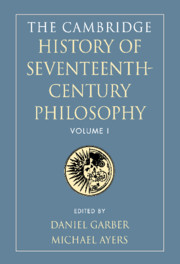Book contents
- Frontmatter
- Introduction
- I The context of seventeenth-century philosophy
- 1 The institutional setting
- 2 The intellectual setting
- 3 European philosophical responses to non-European culture: China
- II Logic, language, and abstract objects
- III God
- IV Body and the physical world
- V Spirit
- Bibliographical appendix
- Bibliography
- References
3 - European philosophical responses to non-European culture: China
from I - The context of seventeenth-century philosophy
Published online by Cambridge University Press: 28 March 2008
- Frontmatter
- Introduction
- I The context of seventeenth-century philosophy
- 1 The institutional setting
- 2 The intellectual setting
- 3 European philosophical responses to non-European culture: China
- II Logic, language, and abstract objects
- III God
- IV Body and the physical world
- V Spirit
- Bibliographical appendix
- Bibliography
- References
Summary
INTRODUCTION
Most seventeenth-century European thinkers who showed a strong interest in non-European philosophy believed in the universal basis of knowledge. The truths that they discovered did not, in their view, end at the borders of Europe. Consequently, when these Europeans encountered other philosophies, they tried to understand the differences in terms of an absolute conception of truth and falsehood rather than regard these other philosophies as merely different or alternative paths to truth.
The European discovery voyages that began in the fifteenth century gradually served as a medium for learning about other cultures, although it took some time for Europeans to learn about the higher forms of knowledge of these regions. This was particularly true with regard to their philosophies. The explorers themselves provided little of this knowledge. Rather, it was missionaries who provided most of it. Because of the religious zeal of the explorer-nations, such as Portugal and Spain, passage was regularly provided on their ships for Catholic missionaries of diverse European nationalities. These missionaries sought contact with peoples in Asia and the Americas and began to learn their languages and study their cultures.
Clearly, these missionaries did not come to this task with detached, impartial attitudes. Even missionaries who admired China, such as the Spanish Dominican D. Navarrete, were too prone to see superstition and idolatry where it did not always exist. Nevertheless, some of these missionaries recognised the importance of learning about the philosophy and religion of these lands.
- Type
- Chapter
- Information
- The Cambridge History of Seventeenth-Century Philosophy , pp. 87 - 100Publisher: Cambridge University PressPrint publication year: 2000
References
- 2
- Cited by



